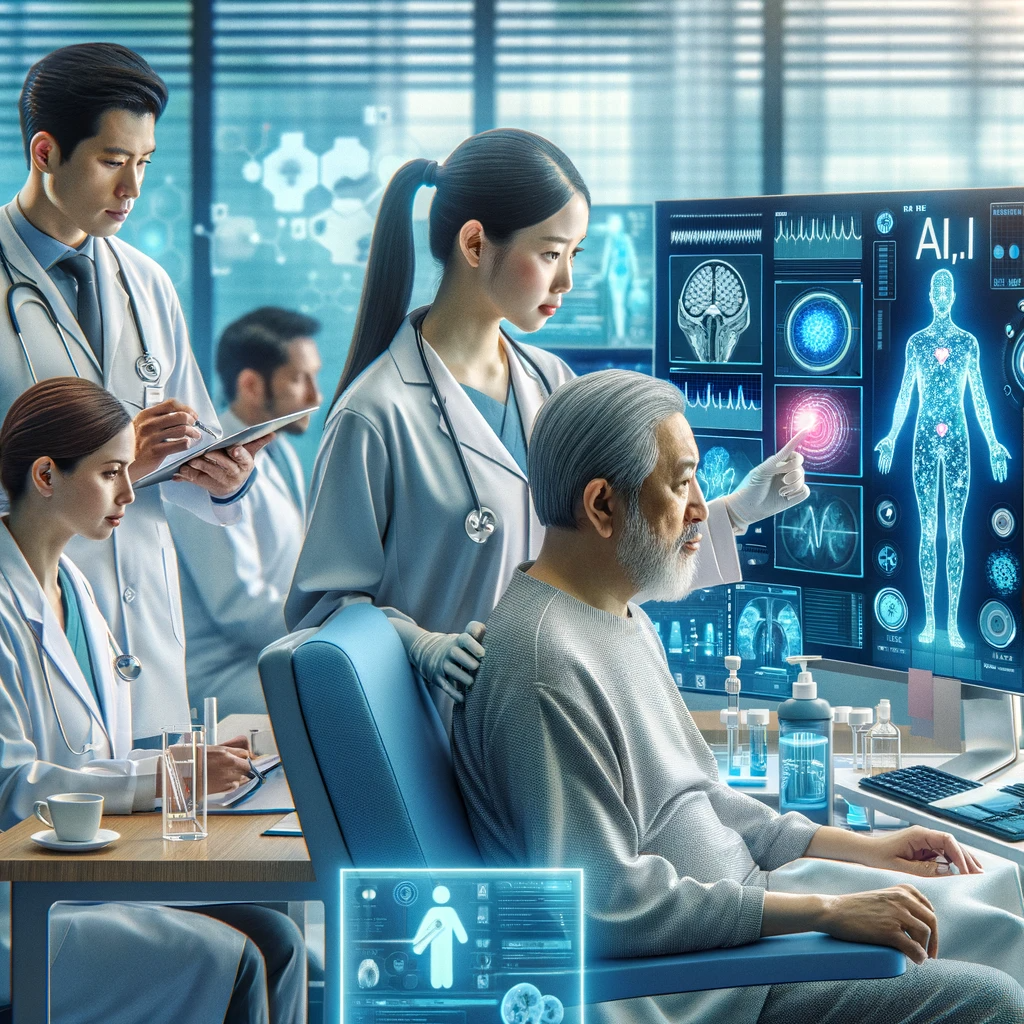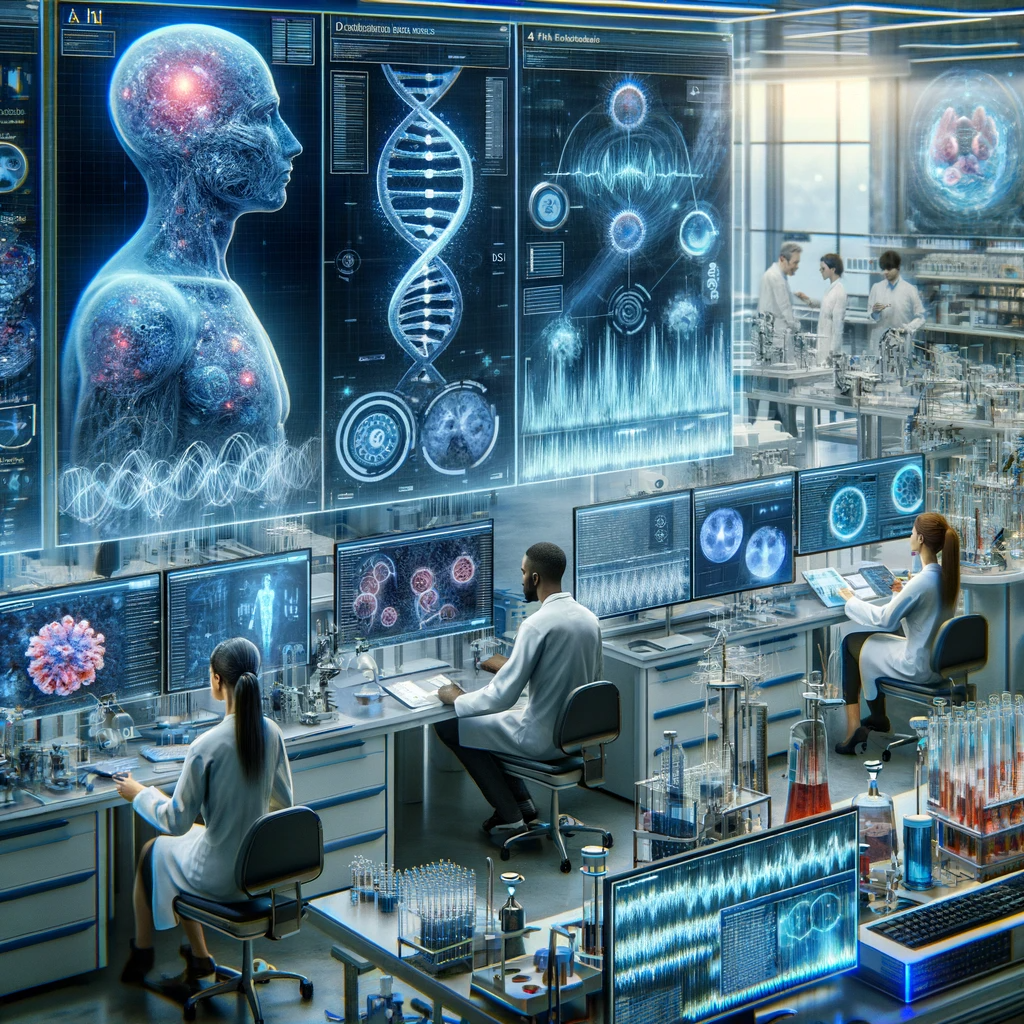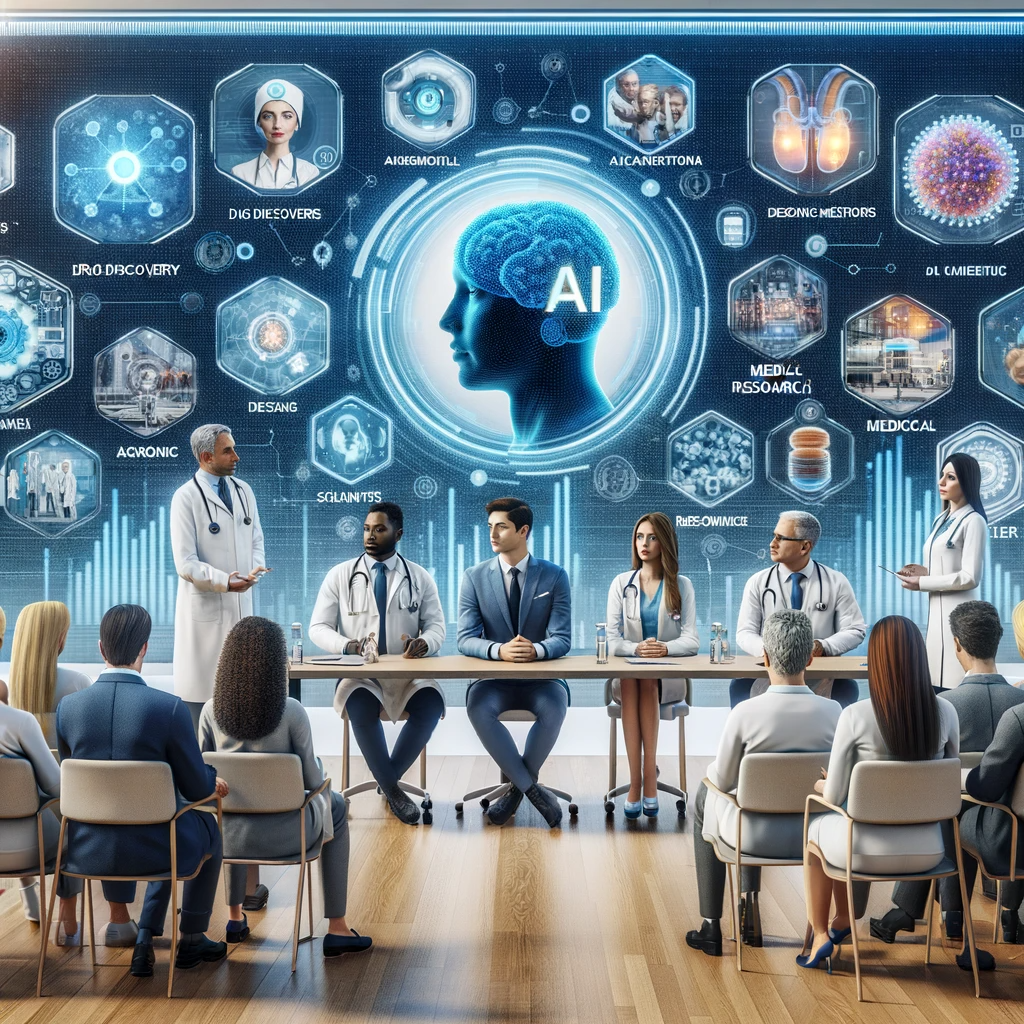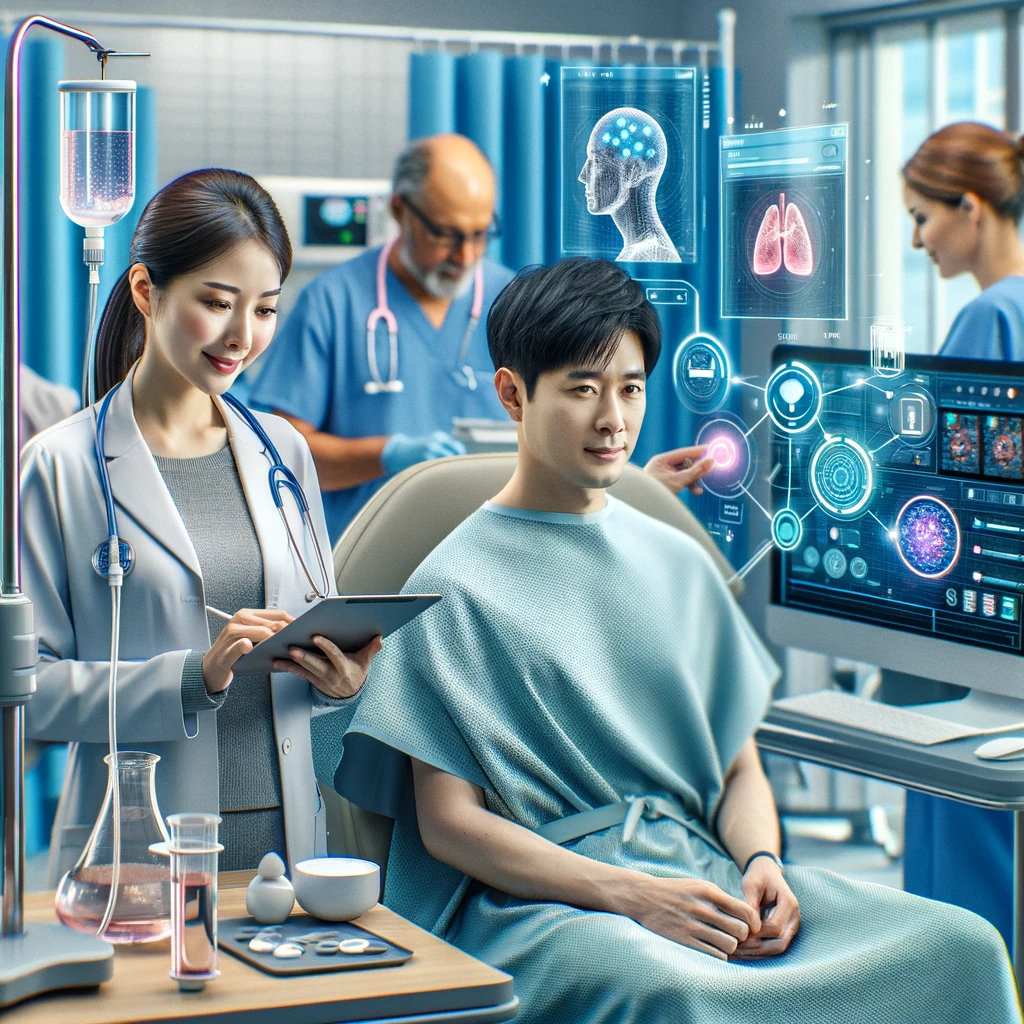Artificial Intelligence (AI) has rapidly become a transformative force across various sectors, significantly impacting the landscape of medical research. With its unparalleled data processing capabilities, predictive analytics, and pattern recognition, AI stands at the forefront of technological advancements that have the potential to revolutionize healthcare. In the realm of medical research, AI’s applications range from drug discovery and genomic analysis to disease diagnosis and treatment strategies, offering new avenues for groundbreaking developments.
The potential of AI in propelling medical research into new frontiers is immense. It holds the promise of accelerating the pace of medical discoveries, improving the accuracy of diagnostic tools, and personalizing patient care. These advancements could lead to significant improvements in patient outcomes and overall healthcare efficiency.
In this article, we will explore the diverse roles of AI in medical research. We’ll examine how AI is shaping drug discovery, its impact on disease diagnosis and treatment planning, and its role in the emerging field of genomic medicine. Additionally, we will address the challenges and ethical considerations of integrating AI into medical research, including issues related to data privacy, algorithmic bias, and the need for human oversight. By delving into these aspects, we aim to answer the central question: How can AI contribute to groundbreaking developments in medical research?

Overview of AI in Medical Research
The integration of Artificial Intelligence (AI) in the medical field marks a significant evolution from its early inception to its current state of sophisticated applications. Initially, AI in medicine focused on simple data management tasks. However, as technology advanced, AI applications expanded into more complex areas, including diagnostics, predictive analytics, and therapeutic development. These advancements were propelled by breakthroughs in machine learning, particularly deep learning, which enabled AI systems to analyze complex medical data with unprecedented accuracy and depth.
Currently, AI’s applications in medical research are diverse and transformative. In data analysis, AI algorithms process vast amounts of patient data to uncover patterns and insights that inform medical research. In drug development, AI expedites the drug discovery process, from initial screening of drug compounds to preclinical testing. Predictive modeling, another crucial application, involves AI forecasting disease progression and patient outcomes, allowing for more informed clinical decision-making.
AI-driven tools in research settings include systems like IBM Watson, which analyzes medical data to assist in treatment planning, and DeepMind’s AI algorithms, which have made significant strides in protein folding – a crucial part of understanding disease mechanisms. These examples demonstrate AI’s growing influence and potential in advancing medical research.
AI in Drug Discovery and Development
AI’s role in drug discovery and development represents one of its most promising applications in medical research. AI algorithms are used to analyze biological datasets to identify potential drug candidates, a process that traditionally takes years. These algorithms can predict how different compounds will behave and how likely they are to make an effective treatment.
Successful AI applications in this field include the use of machine learning models to identify new drug candidates for diseases with no known cures. For example, Atomwise uses AI to analyze small molecules for potential drug therapies, significantly reducing the time and cost associated with traditional drug discovery methods.
AI’s potential to streamline the drug development process also extends to predicting drug interactions and side effects, a critical aspect of ensuring patient safety. By simulating how drugs interact with various biological targets, AI models can predict potential adverse effects before clinical trials, enhancing the efficiency of the drug development process.
AI in Disease Diagnosis and Treatment Planning
AI’s application in disease diagnosis and treatment planning has seen remarkable growth. In diagnostics, AI algorithms analyze medical images, such as X-rays, MRIs, and CT scans, with a level of precision that sometimes surpasses human radiologists. These AI systems can detect subtle patterns in images that may indicate the presence of diseases such as cancer, stroke, or heart disease.
In the realm of treatment planning, AI assists in developing personalized treatment strategies. By analyzing a patient’s medical history, genetics, and current health status, AI systems can suggest tailored treatment plans. This personalized approach ensures patients receive the most effective treatments based on their unique health profiles.
Examples of AI in diagnosis and treatment planning include Google’s DeepMind, which has developed AI for breast cancer analysis, and IBM Watson’s application in oncology, where it assists in creating personalized cancer treatment plans. These AI systems demonstrate the significant potential of AI in enhancing the accuracy and personalization of medical care.

AI and Genomic Medicine
Artificial Intelligence (AI) is playing a transformative role in genomic medicine, a field that focuses on the comprehensive analysis of genes and their functions. AI’s capability to process and analyze large genomic datasets is pivotal in understanding complex genetic diseases and in the development of gene editing technologies. One of AI’s significant contributions is in deciphering the vast and intricate genetic information that forms the basis of many diseases. By analyzing genetic variations and patterns, AI aids in identifying the genetic roots of diseases, including rare and hereditary conditions.
AI’s contribution extends to the development of personalized medicine. Utilizing genomic data, AI algorithms can predict individual responses to different treatments, paving the way for tailored therapeutic approaches. This personalized strategy promises more effective and targeted interventions, minimizing the risks of adverse reactions and improving treatment outcomes.
The potential of AI in genomic medicine also includes advancing gene-editing techniques, such as CRISPR-Cas9. AI can help in identifying potential gene targets for editing and predicting the outcomes of genetic modifications. This application holds significant promise in treating genetic disorders, potentially leading to cures or substantial improvements in disease management.
Challenges and Ethical Considerations
Implementing AI in medical research presents several challenges and ethical considerations. One primary concern is ensuring the accuracy and reliability of AI systems. Inaccuracies in AI algorithms can lead to misinterpretations of medical data, potentially resulting in incorrect diagnoses or ineffective treatment plans. Ensuring the quality and reliability of AI systems is thus paramount.
Ethical considerations in AI-driven medical research are diverse. Patient data privacy is a significant concern, especially given the sensitive nature of medical and genetic information. Ensuring that AI systems respect patient confidentiality and comply with data protection laws is crucial. Algorithmic bias is another ethical concern; AI systems can perpetuate and amplify biases present in the training data, leading to skewed research findings or biased treatment recommendations.
Balancing AI-driven insights with human oversight is also essential. While AI can provide valuable insights, human expertise and ethical judgment are necessary to interpret and apply these findings responsibly. This balance is crucial in maintaining the integrity of medical research and ensuring patient safety.
Future Prospects and Conclusions
The future of AI in medical research is promising and could lead to unprecedented advancements in healthcare. AI’s potential to further personalize medicine, enhance disease diagnosis, and accelerate drug development is vast. As AI systems become more sophisticated, their ability to uncover new insights in medical data and contribute to innovative treatments is likely to increase.
However, the long-term impact of AI on healthcare and patient outcomes depends on how effectively the medical community addresses the ethical and practical challenges associated with AI. This includes ensuring the accuracy of AI systems, safeguarding patient privacy, addressing biases in AI algorithms, and maintaining a balance between AI automation and human expertise.
In conclusion, AI holds transformative potential for medical research, offering possibilities that could reshape healthcare. However, realizing this potential requires careful consideration of the ethical and practical challenges involved. The integration of AI into medical research represents not just a technological evolution but a complex interplay of science, ethics, and human judgment. The future of AI in medical research is not just about technological advancement but also about navigating these challenges responsibly and effectively.

In summarizing the exploration of AI’s role in medical research, it’s evident that this technology is not just a tool but a potential catalyst for transformative advancements in healthcare. AI’s applications, from drug discovery and genomic medicine to disease diagnosis and personalized treatment plans, demonstrate its capability to revolutionize the medical field. However, alongside these technological breakthroughs, there’s a critical need to address the ethical considerations that accompany AI’s integration into healthcare. Balancing the immense potential of AI with the ethical imperatives of patient privacy, data accuracy, and algorithmic bias is crucial for the responsible development and application of these technologies.
As we look towards the future, several questions arise: How will continued advancements in AI shape the landscape of medical research and patient care? Can we establish frameworks that not only foster innovation but also ensure ethical and equitable use of AI in healthcare? And ultimately, how will the integration of AI transform the doctor-patient relationship and the very nature of medical treatment? The answers to these questions will shape not only the future of healthcare but also our understanding of the relationship between technology, ethics, and human well-being.
